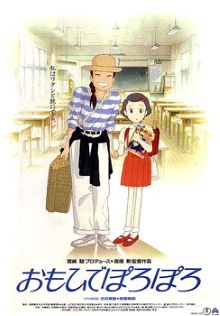
Only Yesterday is one of Studio Ghibli’s earliest films but it received an official U.S. release only last year on the occasion of its 25th anniversary, giving it a new burst of attention. Since I’d never watched I added to our list and I guess I’ll probably eventually work my way through the rest of the studio’s early works someday. This one was directed by Isao Takahata and loosely based on a manga.
It’s the 1980s and Taeko is a 27-year old woman living and working in Tokyo. When she gets some time off, she decides to go to the countryside to work in a farm run by the family of her in-laws. On the train journey, she reminiscences of her childhood as a schoolgirl in 1966. The first such memory is of a similar time when all of her school friends get to leave Tokyo for the holidays but her family has no relatives in the countryside to visit. Other memories deal with childhood crushes and even an embarrassing moment the boys in her class learn that girls have periods. After she arrives, she meets an earnest young man, Toshio, who is a farmer and has been asked to drive her around. As she starts work picking the safflower harvest, she continues to evoke other memories both in private and to her new friends, about how she once dreamed of being an actress but her father forcibly put an end to that dream, of her difficulties with learning mathematics and growing up in a family with two elder sisters and needing to get hand-me-downs from them.
As you can see, the film broadly consists of two parts, the frame story in which the adult Taeko visits the countryside in Yamagata and her memories of her 10-year old self. Apparently the episodic memories were directly drawn from the manga and though they are scattered and don’t form a singular narrative, there’s a compelling sense of authenticity in them. I like that while Taeko remembers them fondly, not all of the events were happy or pleasant for her at the time. I also like how the memories aren’t generic but are instead firmly rooted in her character as a 10-year old girl, touching on the onset of puberty, her not always harmonious relationships when her family and so on. Unfortunately the frame story feels almost like the exact opposite, harping as it does on the beauty and harmony of the countryside and lamenting about how Japanese agriculture is slowly dying. One lengthy conversation between Taeko and Toshio reads like awkward propaganda on behalf of Japan’s rural regions. It didn’t surprise me to later learn that this was added by Studio Ghibli as a way to tie the stories together and wasn’t part of the source material.
Still, weak as the countryside ones are, the scenes are at least pleasant to watch and as usual with hand drawn animation like this, the passing of time doesn’t do anything to make the images look less beautiful. I like the woman-centric nature of the film and how it deals with things from a fundamentally adult perspective even when it is about a little girl. An all round solid film even if its pro-nature message is too heavy-handed.